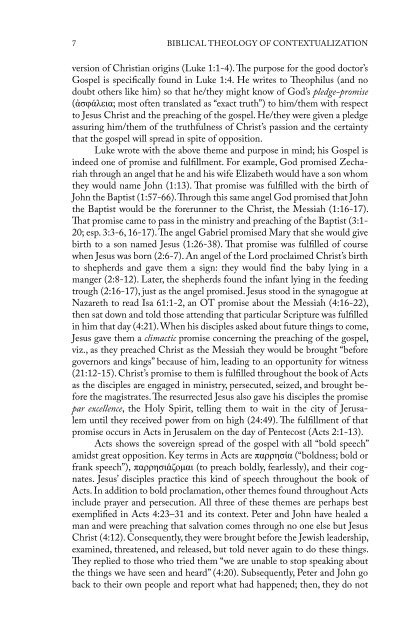The Theology of Missions
The Theology of Missions
The Theology of Missions
You also want an ePaper? Increase the reach of your titles
YUMPU automatically turns print PDFs into web optimized ePapers that Google loves.
7 Biblical <strong>The</strong>ology <strong>of</strong> Contextualization<br />
version <strong>of</strong> Christian origins (Luke 1:1-4). <strong>The</strong> purpose for the good doctor’s<br />
Gospel is specifically found in Luke 1:4. He writes to <strong>The</strong>ophilus (and no<br />
doubt others like him) so that he/they might know <strong>of</strong> God’s pledge-promise<br />
(ἀσφάλεια; most <strong>of</strong>ten translated as “exact truth”) to him/them with respect<br />
to Jesus Christ and the preaching <strong>of</strong> the gospel. He/they were given a pledge<br />
assuring him/them <strong>of</strong> the truthfulness <strong>of</strong> Christ’s passion and the certainty<br />
that the gospel will spread in spite <strong>of</strong> opposition.<br />
Luke wrote with the above theme and purpose in mind; his Gospel is<br />
indeed one <strong>of</strong> promise and fulfillment. For example, God promised Zechariah<br />
through an angel that he and his wife Elizabeth would have a son whom<br />
they would name John (1:13). That promise was fulfilled with the birth <strong>of</strong><br />
John the Baptist (1:57-66). Through this same angel God promised that John<br />
the Baptist would be the forerunner to the Christ, the Messiah (1:16-17).<br />
That promise came to pass in the ministry and preaching <strong>of</strong> the Baptist (3:1-<br />
20; esp. 3:3-6, 16-17). <strong>The</strong> angel Gabriel promised Mary that she would give<br />
birth to a son named Jesus (1:26-38). That promise was fulfilled <strong>of</strong> course<br />
when Jesus was born (2:6-7). An angel <strong>of</strong> the Lord proclaimed Christ’s birth<br />
to shepherds and gave them a sign: they would find the baby lying in a<br />
manger (2:8-12). Later, the shepherds found the infant lying in the feeding<br />
trough (2:16-17), just as the angel promised. Jesus stood in the synagogue at<br />
Nazareth to read Isa 61:1-2, an OT promise about the Messiah (4:16-22),<br />
then sat down and told those attending that particular Scripture was fulfilled<br />
in him that day (4:21). When his disciples asked about future things to come,<br />
Jesus gave them a climactic promise concerning the preaching <strong>of</strong> the gospel,<br />
viz., as they preached Christ as the Messiah they would be brought “before<br />
governors and kings” because <strong>of</strong> him, leading to an opportunity for witness<br />
(21:12-15). Christ’s promise to them is fulfilled throughout the book <strong>of</strong> Acts<br />
as the disciples are engaged in ministry, persecuted, seized, and brought before<br />
the magistrates. <strong>The</strong> resurrected Jesus also gave his disciples the promise<br />
par excellence, the Holy Spirit, telling them to wait in the city <strong>of</strong> Jerusalem<br />
until they received power from on high (24:49). <strong>The</strong> fulfillment <strong>of</strong> that<br />
promise occurs in Acts in Jerusalem on the day <strong>of</strong> Pentecost (Acts 2:1-13).<br />
Acts shows the sovereign spread <strong>of</strong> the gospel with all “bold speech”<br />
amidst great opposition. Key terms in Acts are παρρησία (“boldness; bold or<br />
frank speech”), παρρησιάζομαι (to preach boldly, fearlessly), and their cognates.<br />
Jesus’ disciples practice this kind <strong>of</strong> speech throughout the book <strong>of</strong><br />
Acts. In addition to bold proclamation, other themes found throughout Acts<br />
include prayer and persecution. All three <strong>of</strong> these themes are perhaps best<br />
exemplified in Acts 4:23–31 and its context. Peter and John have healed a<br />
man and were preaching that salvation comes through no one else but Jesus<br />
Christ (4:12). Consequently, they were brought before the Jewish leadership,<br />
examined, threatened, and released, but told never again to do these things.<br />
<strong>The</strong>y replied to those who tried them “we are unable to stop speaking about<br />
the things we have seen and heard” (4:20). Subsequently, Peter and John go<br />
back to their own people and report what had happened; then, they do not

















